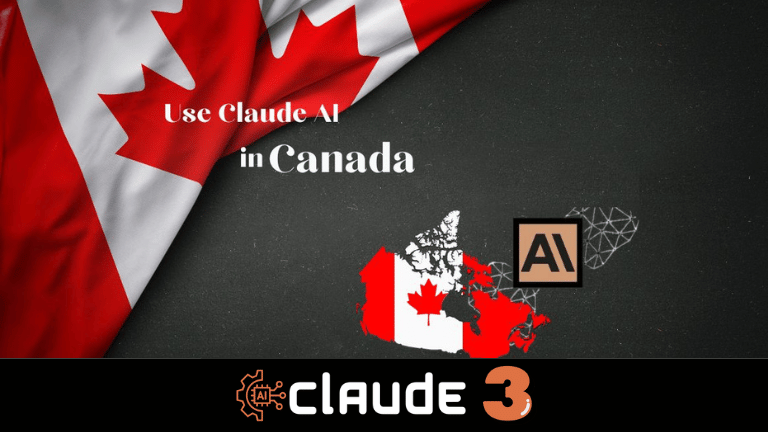Why Claude 3 AI is Not Available in Canada? a leading AI research company, Claude 3 is a cutting-edge AI system that can understand and generate human-like text on a wide range of topics. However, despite its impressive capabilities, Claude 3 AI remains unavailable in Canada, leaving many tech enthusiasts and businesses in the country wondering about the reasons behind this exclusion.
This comprehensive article aims to delve deep into the potential factors contributing to Claude 3 AI’s absence in Canada and explore the broader implications of this decision. Whether you’re a tech enthusiast, a business owner, or simply someone curious about the latest advancements in AI, this blog post will provide you with valuable insights and a comprehensive understanding of the complexities surrounding the availability and deployment of AI systems like Claude.
Understanding Claude 3 AI and Its Capabilities
Before delving into the reasons behind Claude 3 AI’s unavailability in Canada, it’s essential to understand the nature of this advanced language model and its capabilities. Developed using state-of-the-art natural language processing (NLP) techniques, Claude is a large language model trained on a vast corpus of data, enabling it to comprehend and generate human-like text across a wide range of topics and disciplines.
Claude 3 AI’s capabilities extend far beyond simple text generation; it can engage in tasks such as question-answering, data analysis, creative writing, and even coding. This versatility has sparked excitement in various industries, from healthcare and finance to education and entertainment, as businesses and organizations explore the potential of integrating Claude into their operations.
However, the development and deployment of such powerful AI systems also raise significant concerns regarding security, privacy, and ethical implications, which may contribute to the decision to restrict Claude AI’s availability in certain regions or countries.
Potential Reasons for Claude AI’s Unavailability in Canada
Several factors could potentially contribute to Claude 3 AI’s absence in Canada, ranging from regulatory considerations and data privacy concerns to ethical implications and market strategies. Let’s explore some of the potential reasons behind this decision.
Regulatory Compliance and Data Privacy Laws
One of the primary reasons for Claude AI’s unavailability in Canada could be related to the country’s strict data privacy laws and regulations. Canada has robust data protection frameworks, such as the Personal Information Protection and Electronic Documents Act (PIPEDA) and the Privacy Act, which govern the collection, use, and disclosure of personal information.
As Claude AI is a language model trained on vast amounts of data, there may be concerns about the potential inclusion of sensitive personal information within its training data. Anthropic may need to ensure that Claude AI complies with Canada’s data privacy laws before making it available in the country, a process that could be time-consuming and complex.
Additionally, Canada’s regulatory bodies may require extensive assessments and certifications to ensure that Claude AI adheres to ethical and safety standards, particularly in industries with heightened risks, such as healthcare or finance.
Ethical Considerations and Responsible AI Deployment
Another potential reason for Claude AI’s absence in Canada could be related to ethical considerations surrounding the deployment of advanced AI systems. As AI technologies become more powerful and integrated into various aspects of society, there is a growing emphasis on ensuring that these systems are developed and deployed in a responsible and ethical manner.
Canada has taken a proactive stance in promoting the responsible development and use of AI through initiatives such as the Montreal Declaration for Responsible AI and the Pan-Canadian Artificial Intelligence Strategy. These efforts aim to establish guidelines and frameworks for the ethical deployment of AI systems, ensuring they align with human values, respect individual privacy, and mitigate potential biases or harmful outcomes.
Anthropic may need to demonstrate that Claude AI adheres to these ethical principles and guidelines before gaining approval for its deployment in Canada. This process could involve extensive consultations with stakeholders, including policymakers, ethicists, and representatives from various industries and communities.
Intellectual Property and Market Strategy Considerations
While regulatory compliance and ethical considerations are crucial factors, the decision to withhold Claude AI from the Canadian market could also be influenced by intellectual property (IP) and market strategy considerations.
Anthropic may have chosen to prioritize the launch and deployment of Claude AI in specific regions or markets, based on factors such as market size, potential demand, and competition. Additionally, the company may be pursuing strategic partnerships or collaborations in certain regions that could influence the timing and rollout of Claude AI’s availability.
Furthermore, Anthropic may be taking measures to protect its intellectual property and safeguard Claude AI’s underlying technology and algorithms from potential infringement or misuse. This could involve implementing strict access controls, licensing agreements, or other measures that may delay or restrict the availability of Claude AI in certain regions or countries.
Infrastructure and Resource Considerations
Deploying an advanced AI system like Claude at a large scale requires significant computational resources, infrastructure, and operational capabilities. Anthropic may be navigating challenges related to scaling its infrastructure and ensuring reliable, secure, and cost-effective delivery of Claude AI’s services across various regions.
The decision to initially limit Claude AI’s availability could be driven by the need to first establish and optimize the necessary infrastructure, data centers, and operational processes within specific regions. This approach could allow Anthropic to ensure a smooth and consistent user experience while minimizing potential performance or reliability issues that could arise from a premature, widespread deployment.
Additionally, Anthropic may be prioritizing the allocation of computational resources and infrastructure investments based on strategic considerations, such as market demand, revenue potential, or partnerships within certain regions.

Implications of Claude 3 AI’s Unavailability in Canada
The absence of Claude AI in Canada has far-reaching implications that extend beyond just the potential users and businesses within the country. Let’s explore some of the broader implications and impacts of this decision.
Missed Opportunities for Innovation and Economic Growth
Canada has a thriving technology sector and a strong focus on fostering innovation and digital transformation. The unavailability of Claude AI could potentially hinder the ability of Canadian businesses and organizations to leverage the latest AI advancements, potentially impacting their competitiveness and innovation capabilities.
Furthermore, the absence of Claude AI could limit the opportunities for Canadian researchers, developers, and entrepreneurs to explore and contribute to the advancement of AI technologies. This could lead to a brain drain, as talented individuals and companies may seek opportunities in regions where they can access and work with cutting-edge AI systems like Claude.
Ethical and Societal Implications
The deployment of advanced AI systems like Claude AI raises important ethical and societal questions, and its absence in Canada could have implications for the country’s ability to shape and influence the responsible development and use of these technologies.
Without direct access to Claude AI, Canadian policymakers, ethicists, and stakeholders may face challenges in fully understanding and assessing its capabilities, potential biases, and impact on society. This could hinder the development of informed policies, guidelines, and ethical frameworks specific to the Canadian context.
Additionally, the exclusion of Claude AI from Canada could potentially limit the opportunities for public dialogue, education, and awareness-raising efforts surrounding the responsible use of AI technologies. This could contribute to a knowledge gap and impede the development of a well-informed and engaged public discourse on the ethical implications of AI.
Regulatory and Policy Implications
The unavailability of Claude AI in Canada could also have implications for the country’s regulatory and policy landscape surrounding AI technologies. Without direct exposure to and experience with advanced AI systems like Claude, Canadian regulatory bodies and policymakers may face challenges in developing and implementing effective regulations and governance frameworks.
Regulatory processes often rely on real-world use cases and empirical data to inform decision-making. The absence of Claude AI could limit the ability of Canadian regulators to assess its impact, identify potential risks or issues, and develop appropriate safeguards and oversight mechanisms.
Furthermore, the exclusion of Claude AI from Canada could potentially hinder the country’s ability to contribute to and influence international standards, guidelines, and best practices related to the development and deployment of AI technologies.
Impact on Industry Sectors and Potential Use Cases
The versatility of Claude AI and its potential applications across various industries make its unavailability in Canada a notable limitation for businesses and organizations operating in sectors such as healthcare, finance, education, and creative industries.
For example, in the healthcare sector, Claude AI could be leveraged for tasks like medical research, patient communication, and clinical decision support. Its absence could limit the ability of Canadian healthcare providers and researchers to explore and adopt these innovative solutions, potentially impacting the quality and efficiency of healthcare services.
Similarly, in the finance sector, Claude AI could be used for tasks like risk analysis, fraud detection, and customer service automation. Its unavailability could hinder Canadian financial institutions from realizing the potential benefits of AI-driven solutions, impacting their competitiveness and operational efficiency.
The creative industries, such as advertising, marketing, and content creation, could also be impacted by the absence of Claude AI, as it could potentially limit the exploration of AI-assisted creative processes and innovative content generation.
Overcoming the Challenges and Enabling Claude AI’s Availability in Canada
While the reasons behind Claude AI’s unavailability in Canada may be complex and multifaceted, there are potential steps and strategies that could be explored to overcome these challenges and enable its responsible deployment within the country.
Collaboration and Engagement with Stakeholders
To address the regulatory and ethical concerns surrounding Claude AI’s availability in Canada, Anthropic could engage in proactive collaboration and dialogue with relevant stakeholders, including government agencies, policymakers, industry associations, and civil society organizations.
By fostering open communication and transparency, Anthropic could gain a better understanding of the specific concerns and requirements within the Canadian context. This could pave the way for constructive discussions and collaborative efforts to address issues related to data privacy, ethical considerations, and responsible AI deployment.
Additionally, Anthropic could leverage the expertise and insights of Canadian AI researchers, ethicists, and thought leaders to inform the responsible development and deployment of Claude AI within the country.
Compliance and Certification Processes
To overcome regulatory hurdles and ensure compliance with Canadian data privacy laws and ethical guidelines, Anthropic could pursue relevant certifications and audits to demonstrate that Claude AI adheres to the highest standards of data protection, security, and ethical practices.
This process could involve working closely with regulatory bodies, undergoing rigorous assessments, and implementing appropriate safeguards and controls to mitigate potential risks and ensure responsible use of Claude AI within the Canadian context.
Anthropic could also explore opportunities to contribute to the development of industry standards, best practices, and guidelines specific to the deployment of AI systems like Claude in Canada, further solidifying its commitment to responsible and ethical practices.
Infrastructure and Resource Planning
To address the infrastructure and resource considerations, Anthropic could explore strategic partnerships and collaborations with Canadian technology companies, research institutions, or cloud service providers. These collaborations could facilitate the establishment of the necessary infrastructure and computational resources required for the reliable and scalable deployment of Claude AI within Canada.
Additionally, Anthropic could consider investing in the development of localized data centers and infrastructure within Canada, ensuring compliance with data sovereignty and residency requirements while also optimizing performance and reliability for Canadian users.
Furthermore, Anthropic could explore opportunities to leverage Canada’s talent pool and skilled workforce in AI and related technologies, fostering local expertise and contributing to the development of a robust AI ecosystem within the country.
Intellectual Property and Market Strategy Alignment
To address potential intellectual property and market strategy concerns, Anthropic could explore licensing agreements, partnerships, or joint ventures with Canadian businesses or organizations. These collaborations could enable the responsible deployment of Claude AI within the Canadian market while safeguarding Anthropic’s intellectual property and aligning with its overall business strategy.
Additionally, Anthropic could consider targeted marketing and awareness campaigns to educate Canadian businesses, organizations, and the general public about the potential benefits and responsible use cases of Claude AI. By fostering a better understanding and demand for these advanced AI technologies, Anthropic could create a more favorable environment for the introduction and adoption of Claude AI within the Canadian market.
Public Engagement and Awareness Initiatives
To address the ethical and societal implications of Claude AI’s unavailability in Canada, Anthropic could engage in proactive public awareness and education initiatives. These efforts could involve collaborating with academic institutions, think tanks, and civil society organizations to foster public dialogue and understanding around the responsible development and use of AI technologies.
By promoting transparency and open communication, Anthropic could help demystify the complexities of AI systems like Claude, address concerns and misconceptions, and contribute to a well-informed public discourse on the potential impacts and implications of these technologies within the Canadian context.
Additionally, Anthropic could support and participate in initiatives aimed at promoting digital literacy, ethical AI education, and responsible technology use among Canadian citizens, further contributing to the development of a responsible and inclusive AI ecosystem within the country.
Conclusion
The unavailability of Claude AI in Canada represents a complex challenge with far-reaching implications for the country’s innovation landscape, regulatory environment, and societal discourse around emerging technologies. While the reasons behind this decision may stem from various factors, including regulatory compliance, ethical considerations, intellectual property strategies, and infrastructure challenges, overcoming these obstacles is crucial for Canada to fully harness the potential of advanced AI systems like Claude.
By fostering collaboration and engagement with stakeholders, pursuing compliance and certification processes, strategically planning infrastructure and resource allocation, aligning intellectual property and market strategies, and promoting public engagement and awareness initiatives, Anthropic and other AI developers can pave the way for the responsible and ethical deployment of Claude AI within Canada.
Ultimately, the absence of Claude AI in Canada serves as a reminder of the complexities and challenges surrounding the integration of advanced AI technologies into society. It highlights the need for a multifaceted approach that balances technological innovation with ethical considerations, regulatory frameworks, and public trust.
As the AI landscape continues to evolve, it is crucial for Canada to remain actively engaged in shaping the development and deployment of these technologies, ensuring that the country remains competitive and at the forefront of responsible AI innovation. By addressing the challenges surrounding Claude AI’s availability, Canada can position itself as a leader in the ethical and responsible adoption of AI, fostering a future where these transformative technologies contribute to economic growth, societal well-being, and the advancement of knowledge.

FAQs
1. Why is Claude 3 AI not available in Canada?
Claude 3 AI is not available in Canada due to regulatory restrictions or licensing agreements that limit its availability in certain regions.
2. Will Claude 3 AI be available in Canada in the future?
There is no official announcement regarding Claude 3 AI’s availability in Canada in the future. It depends on various factors, including regulatory changes and market demand.
3. Can I use a VPN to access Claude 3 AI in Canada?
Using a VPN to access Claude 3 AI in Canada may violate the terms of service and could result in the termination of your account.
4. Are there any alternatives to Claude 3 AI available in Canada?
Yes, there are several AI and language models available in Canada, including ChatGPT and GPT-4, that can be used for similar purposes.
5. How can I stay updated on Claude 3 AI’s availability in Canada?
You can stay updated by following official announcements from Claude 3 AI or its parent company, Anthropic, regarding its availability in Canada.
6. Can I request Claude 3 AI to be available in Canada?
You can express your interest in having Claude 3 AI available in Canada by contacting Claude 3 AI’s customer support or through their official channels.
7. Are there any legal implications of using Claude 3 AI in Canada?
Using Claude 3 AI in Canada where it is not officially available may have legal implications, including violating the terms of service or infringing on intellectual property rights.
8. Can I use Claude 3 AI in Canada if I travel to a supported region?
Yes, you can use Claude 3 AI in Canada if you travel to a region where it is officially supported, but you may encounter limitations based on your location.
9. Are there any plans to expand Claude 3 AI’s availability to Canada?
There is no official information on plans to expand Claude 3 AI’s availability to Canada at this time.
10. How does Claude 3 AI’s unavailability in Canada impact users?
The unavailability of Claude 3 AI in Canada may limit access to its features and functionalities for users in the region, impacting their ability to use the platform for various purposes.
